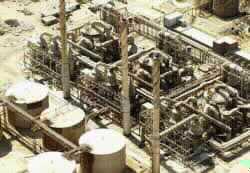HIGHLIGHTS: No Conclusions Drawn on Significance of Changes Until Inspectors See them on the Ground||Bush Efforts to Secure Support of UN Security Council Hit Tough Resistance From Russia||Butler Rejects Cheney's Assessment of UN Inspectors' Work in Iraq|| STORY: U.N. experts studying satellite photos of Iraq have identified new construction at several sites linked in the past to Baghdad's development of nuclear weapons, U.N. officials said Friday.
But the experts, including Mark Gwozdecky of the International Atomic Energy Agency, said they could not draw any conclusions on the significance of the changes at these sites until U.N. weapons inspectors can get in to see them on the ground.
The report of new activity at the sites coincided with the Bush administration's campaign for military action against Iraq, contending Baghdad was probably reconstructing its atomic program, though no hard evidence has been disclosed.
The International Atomic Energy Agency is in charge of ridding Iraq of nuclear materials and its inspectors work in tandem with those from the New York-based U.N. Monitoring, Verification and Inspection Commission, which is responsible for Iraq's chemical, biological and ballistic missile programs.
Both have access to commercial satellite photography, which was contracted earlier this year, but no dramatic disclosures have been reported. The inspectors left Iraq in mid-December 1998, hours before a U.S.-British bombing raid, and have not been allowed to return.
Inspections are a key requirement toward suspending sanctions against Iraq, imposed after Baghdad's troops invaded Kuwait in August 1990.
BUSH EFFORTS TO SECURE SUPPORT FROM UN SECURITY COUNCIL HIT TOUGH RESISTANCE FROM RUSSIA
Meanwhile, reports from Moscow indicate that Washington's first major efforts to secure support from members of the UN Security Council for military action against Iraq have hit tough resistance from Russia, a much needed ally. Russian Foreign Minister Igor Ivanov Friday reiterated Moscow's opposition to U-S plans concerning Iraq. Ivanov said that President Vladimir Putin, told US President George Bush that he had "deep doubts" about the justification for a strike.
Mr Bush had also received a similar response from French President Jacques Chirac and Chinese President Jiang Zemin, other leaders with reservations towards a strike. In Paris, UN Secretary General, Kofi Annan who met in the French capital with the French President today, later spoke to the press welcoming President Bush address to the UN General Assembly in New York next week and added that he did tell President Bush that an attack against Iraq at this time would be unwise. Bush said on Wednesday he would offer some ideas on how to deal with Saddam when he addresses the U.N. General Assembly.
BUTLER REJECTS CHENEY'S ASSESSMENT OF UN WEAPONS INSPECTORS' WORK IN IRAQ
In another development, A former UN weapons inspector for Iraq has cautioned US President George W Bush against launching a pre-emptive strike against Iraq, unless he can show clear
evidence that Saddam Hussein's regime is developing weapons of mass destruction. In remarks made during an interview on Australian Television, Australian Richard Butler, also said he strongly disagreed with remarks made by US vice president Dick Cheney that the resumption of weapons inspections in Iraq would be futile.
PHOTO CAPTION
This is a general view of an Iraqi fertilizer production plant near Akashat, Iraq, 500 kilometers (310 miles) northeast of the capital which was visited by journalists on Monday, Sept. 2, 2002. The complex is claimed to be a suspected nuclear site, but Iraqi officials claimed the uranium extraction plant is not operating now contrary to U.S. allegations. (AP Photo/Ali Haider
- Author:
& News Agencies - Section:
WORLD HEADLINES


 Home
Home Discover Islam
Discover Islam Quran Recitations
Quran Recitations Lectures
Lectures
 Fatwa
Fatwa Articles
Articles Fiqh
Fiqh E-Books
E-Books Boys & Girls
Boys & Girls  Hajj Rulings
Hajj Rulings Hajj Fatwas
Hajj Fatwas














